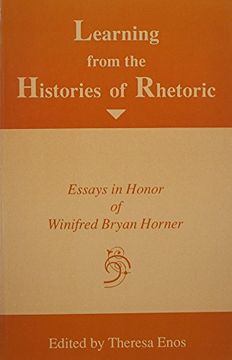Compartir
Learning From the Histories of Rhetoric: Essays in Honor of Winifred Bryan Horner (en Inglés)
Winifred Bryan Horner; Theresa Enos (Autor)
·
Southern Illinois University Press
· Tapa Blanda
Learning From the Histories of Rhetoric: Essays in Honor of Winifred Bryan Horner (en Inglés) - Winifred Bryan Horner; Theresa Enos
$ 185.09
$ 370.18
Ahorras: $ 185.09
Elige la lista en la que quieres agregar tu producto o crea una nueva lista
✓ Producto agregado correctamente a la lista de deseos.
Ir a Mis Listas
Origen: Estados Unidos
(Costos de importación incluídos en el precio)
Se enviará desde nuestra bodega entre el
Miércoles 29 de Mayo y el
Jueves 06 de Junio.
Lo recibirás en cualquier lugar de México entre 1 y 3 días hábiles luego del envío.
Reseña del libro "Learning From the Histories of Rhetoric: Essays in Honor of Winifred Bryan Horner (en Inglés)"
This collection of eleven essays honors Winifred Bryan Horner for her sustained effort to establish that the special nature of rhetoric and composition leads the discipline to theorize practice and to apply theory as its central acts.Theresa Enos urges those in the field to learn from the histories of rhetoric in order to draw rhetoric and composition together and to understand theory in practice and the practice of theory as conceptualized by Aristotle. Rhetoric, the oldest of the humanities, has practice as its very basis, but English faculty who teach history of rhetoric courses often think that studying rhetorical history for its own sake is enough. In addition, the typical history course taught in English departments is nearly identical to the traditional ones that have been taught in speech and communication departments for three-quarters of a century. Enos believes that using the infrastructure of courses taught in speech does not meet the needs of teachers of written communication.Learning from the Histories of Rhetoric is based on the problems Enos has perceived when history has not been connected to teaching, learning, using. Her goal is both to honor Winifred Horner, who has spent her career in trying to make usable connections between rhetoric and composition, and to feature well-known historians of rhetoric who can translate what they have learned about the history of rhetoric into the writing classroom. As future teachers of writing take courses in history as part of core curricula, Enos believes this volume can be a concise complement to the thousands of pages of history and theory they will be reading—that it can be a resource guide that will generate and enrich discussion, further suggestions for teaching, and heighten awareness of the uses of history for writing teachers.Enos has organized the essays into two parts: "Studying the Histories of Rhetoric" and "Teaching the Histories of Rhetoric." Richard Lloyd-Jones begins part 1 by interweaving personal and professional history as a pedagogue who consciously and explicitly uses the history of rhetoric. Thomas P. Miller makes a strong argument for broadening our knowledge of rhetorical traditions and deepening our perceptions of what they can mean to teaching. Donald C. Stewart suggests how we might reach into our history to find a philosophical model for present-day college rhetoric and composition programs. And Edward P. J. Corbett charts the history closest to teachers and administrators in writing programs.In part 2, Susan C. Jarratt concentrates on Sappho to demonstrate that women’s ways of thinking and writing can differ from men’s. Marjorie Curry Woods shows that writing pedagogy from medieval times can be useful to current classroom strategies. Both Jean Dietz Moss and Kathleen E. Welch focus on dialectic, Moss showing how closely dialectic and rhetoric worked together in the Renaissance and Welch continuing the argument for including dialectic in college writing courses. Richard Leo Enos and S. Michael Halloran delineate strong relationships between classical rhetoric and two present-day approaches to writing: peer collaboration and declamation.
- 0% (0)
- 0% (0)
- 0% (0)
- 0% (0)
- 0% (0)
Respuesta:
Todos los libros de nuestro catálogo son Originales.
Respuesta:
El libro está escrito en Inglés.
Respuesta:
La encuadernación de esta edición es Tapa Blanda.
✓ Producto agregado correctamente al carro, Ir a Pagar.

